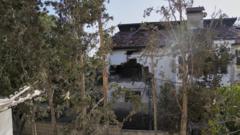In a dramatic escalation of humanitarian crisis, the UN's World Food Programme (WFP) revealed that it has completely exhausted its food aid supplies in Gaza due to an ongoing Israeli blockade.
UN Food Aid Depleted in Gaza Amid Continued Israeli Blockade

UN Food Aid Depleted in Gaza Amid Continued Israeli Blockade
The World Food Programme announces dire shortages as humanitarian access remains blocked.
The WFP confirmed that its last remaining food stocks were delivered to hot meal kitchens on Friday, which are set to run out in just days, jeopardizing food security for the 2.1 million residents of Gaza. The Israeli government initiated a blockade on March 2, leading to a renewed offensive two weeks later after the breakdown of a ceasefire agreement. Israel maintains that it is acting within international law, countering claims of a humanitarian crisis, asserting that no aid shortage exists.
By the end of March, all 25 bakeries in Gaza had shuttered as they ran out of wheat flour and cooking fuel, while previously distributed food parcels for families have also been depleted. The UN Office for the Coordination of Humanitarian Affairs (OCHA) reported severe shortages extending beyond food to medicine and critical supplies for hospitals, now overwhelmed by casualties from ongoing bombardments. Fuel shortages further compromise essential water production and distribution services.
The ongoing blockade—reported as the longest in Gaza's history—has critically destabilized local markets, seeing food prices surge upwards of 1,400%, causing serious nutrition deficits among the most vulnerable, especially children, pregnant and nursing women, and the elderly. Although the hot meal kitchens have provided minimal sustenance, they can only meet half the demand, supplying a mere quarter of the daily nutritional needs of the population.
The WFP emphasized the urgent need for humanitarian access, stressing that without immediate lifting of border restrictions for aid and trade, their critical support could cease altogether. "People are running out of ways to cope," the agency stated, warning that prior fragile improvements made during a temporary ceasefire are now severely undermined.
Over 116,000 tonnes of food aid, enough for one million people, is currently positioned and prepared for delivery, pending the reopening of Gaza's borders to allow access. In a recent rebuttal to international criticism, including from the UK, France, and Germany—who condemned the blockade as "intolerable"—Israel cited that it had facilitated the entry of significant aid during the earlier ceasefire.
The Israeli Ministry of Foreign Affairs pointed out that the operations are closely monitored to avoid misappropriation by Hamas, who has been accused of commandeering aid supplies for its military objectives. In contrast, Hamas disputes these allegations, claiming no such theft has occurred.
Tensions further escalated last week when Hamas declined an Israeli ceasefire proposal that included disarmament stipulations in exchange for a temporary cessation of hostilities and the release of some hostages. The humanitarian situation continues to deteriorate in the context of ongoing military engagements that have claimed many lives since the outbreak of hostilities on October 7, when an unprecedented attack resulted in significant casualties. The impact of this intensifying conflict has led to devastating consequences, with over 51,000 confirmed deaths in Gaza to date.
By the end of March, all 25 bakeries in Gaza had shuttered as they ran out of wheat flour and cooking fuel, while previously distributed food parcels for families have also been depleted. The UN Office for the Coordination of Humanitarian Affairs (OCHA) reported severe shortages extending beyond food to medicine and critical supplies for hospitals, now overwhelmed by casualties from ongoing bombardments. Fuel shortages further compromise essential water production and distribution services.
The ongoing blockade—reported as the longest in Gaza's history—has critically destabilized local markets, seeing food prices surge upwards of 1,400%, causing serious nutrition deficits among the most vulnerable, especially children, pregnant and nursing women, and the elderly. Although the hot meal kitchens have provided minimal sustenance, they can only meet half the demand, supplying a mere quarter of the daily nutritional needs of the population.
The WFP emphasized the urgent need for humanitarian access, stressing that without immediate lifting of border restrictions for aid and trade, their critical support could cease altogether. "People are running out of ways to cope," the agency stated, warning that prior fragile improvements made during a temporary ceasefire are now severely undermined.
Over 116,000 tonnes of food aid, enough for one million people, is currently positioned and prepared for delivery, pending the reopening of Gaza's borders to allow access. In a recent rebuttal to international criticism, including from the UK, France, and Germany—who condemned the blockade as "intolerable"—Israel cited that it had facilitated the entry of significant aid during the earlier ceasefire.
The Israeli Ministry of Foreign Affairs pointed out that the operations are closely monitored to avoid misappropriation by Hamas, who has been accused of commandeering aid supplies for its military objectives. In contrast, Hamas disputes these allegations, claiming no such theft has occurred.
Tensions further escalated last week when Hamas declined an Israeli ceasefire proposal that included disarmament stipulations in exchange for a temporary cessation of hostilities and the release of some hostages. The humanitarian situation continues to deteriorate in the context of ongoing military engagements that have claimed many lives since the outbreak of hostilities on October 7, when an unprecedented attack resulted in significant casualties. The impact of this intensifying conflict has led to devastating consequences, with over 51,000 confirmed deaths in Gaza to date.



















